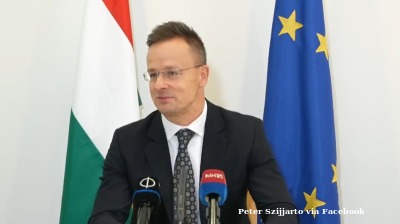The European Union is considering allowing new member states to join the bloc without full voting rights, in a move aimed at reviving enlargement and overcoming resistance from countries such as Hungary, diplomats said as quoted by Politico.
Earlier this month, it was reported that Austria and Slovenia are among the EU member states advocating for the introduction of qualified majority voting in decisions on EU enlargement.
The proposal, which has been under discussion for months, seeks to reduce the hurdles created by the current unanimity rule that allows any member state to veto the start of accession talks or the admission of new members.
If adopted, the reform could accelerate the accession process for countries such as Ukraine, Moldova, and potentially Western Balkan states including North Macedonia, Serbia and Kosovo. However, reaching consensus within the EU remains a challenge.
Supporters argue the approach could make enlargement more flexible without changing the EU’s founding treaties — a politically sensitive step opposed by several governments. “Future members should waive their right of veto until reforms are in place,” said Anton Hofreiter, chair of the German Bundestag’s European Affairs Committee, adding that this would prevent the bloc from “holding up enlargement through the back door,” Politico reported on October 20.
Hofreiter said the proposal for new members to join without full voting rights would help the EU “remain effective and capable of action even after enlargement.” He added that representatives from Western Balkan countries had expressed support for the idea, describing it as both “constructive and realistic.”
However, Hungarian Prime Minister Viktor Orbán has emerged as one of the staunchest opponents of the proposal, effectively stalling efforts to strengthen EU decision-making and maintain the veto power of individual member states.
EU leaders are expected to revisit the debate at the upcoming European Council meeting on October 23–24.
News

Hungary to challenge EU’s ban on Russian gas imports, vows to block REPowerEU
Hungarian Foreign Minister Peter Szijjarto says the European Council’s decision to ban Russian fossil fuel imports by 2027 could jeopardise Hungary’s energy security.

Slovak Foreign Minister Blanár reiterates support for Ukraine’s EU bid
Juraj Blanár says Ukraine is "ready in a way" for accession, but notes objections from some EU member states.

Poland’s Empik prepares Warsaw IPO, reportedly to raise up to €200mn
Book and media retailer Empik is planning to launch an IPO on the Warsaw Stock Exchange in 2026.

Kremlin says leaders’ good relations helped Budapest secure summit
Hungary is expected to host a second summit between Vladimir Putin and Donald Trump on Ukraine after their talks in Alaska in August did not lead to a breakthrough.
_2_1761012864.jpg)



